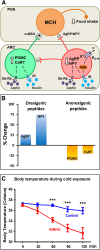Insulin action in brain regulates systemic metabolism and brain function
- PMID: 24931034
- PMCID: PMC4066341
- DOI: 10.2337/db14-0568
Insulin action in brain regulates systemic metabolism and brain function
Abstract
Insulin receptors, as well as IGF-1 receptors and their postreceptor signaling partners, are distributed throughout the brain. Insulin acts on these receptors to modulate peripheral metabolism, including regulation of appetite, reproductive function, body temperature, white fat mass, hepatic glucose output, and response to hypoglycemia. Insulin signaling also modulates neurotransmitter channel activity, brain cholesterol synthesis, and mitochondrial function. Disruption of insulin action in the brain leads to impairment of neuronal function and synaptogenesis. In addition, insulin signaling modulates phosphorylation of tau protein, an early component in the development of Alzheimer disease. Thus, alterations in insulin action in the brain can contribute to metabolic syndrome, and the development of mood disorders and neurodegenerative diseases.
© 2014 by the American Diabetes Association.
Figures





References
-
- Belfiore A, Frasca F, Pandini G, Sciacca L, Vigneri R. Insulin receptor isoforms and insulin receptor/insulin-like growth factor receptor hybrids in physiology and disease. Endocr Rev 2009;30:586–623 - PubMed
-
- Fernandez AM, Torres-Alemán I. The many faces of insulin-like peptide signalling in the brain. Nat Rev Neurosci 2012;13:225–239 - PubMed
-
- Zhao WQ, Chen H, Quon MJ, Alkon DL. Insulin and the insulin receptor in experimental models of learning and memory. Eur J Pharmacol 2004;490:71–81 - PubMed
Publication types
MeSH terms
Substances
Grants and funding
LinkOut - more resources
Full Text Sources
Other Literature Sources
Medical
Miscellaneous

